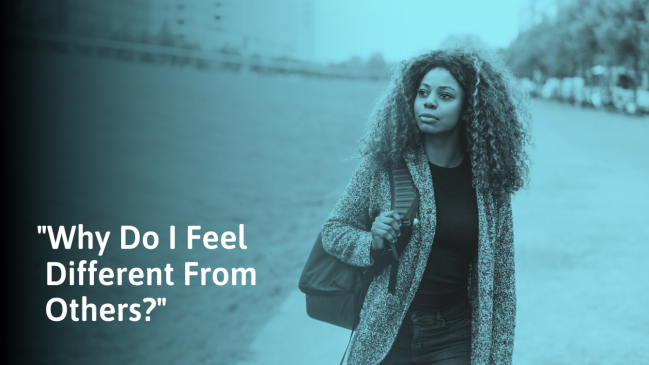Do you often feel that there’s something different about you? Do you find it hard to relate to others? Perhaps you suspect that you think, feel, and act differently from those around you. But although feeling different can be tough, you might be reassured to know that lots of people have the same problem.
In this article, we’ll talk about the reasons why you feel different and what you can do about it.
Sections
Why do I feel different from others?
There are several reasons why you may feel as though you don’t quite fit in. Here are a few to consider.
1. You have a mental health problem
Mental health problems, including anxiety, addictions, and depression, can cause you to see and think about yourself, the world, and other people in an unusual way. For example, if you have depression, you probably pay more attention to the negative things around you compared to people without depression,[1] which can set you apart from others.
Depersonalization-derealization disorder (DDD) can make you feel cut off from everyone and everything around you. The main symptoms are a sense of unreality, feelings of panic, and a sense of detachment. Although most don’t meet the criteria for a diagnosis of DDD, up to 75% of people experience some symptoms of derealization or depersonalization at some point in their lives.[2]
2. You have experienced trauma
Feeling different is a common side effect of trauma.[3] If you’ve experienced one or more traumatic events, you might feel numb, socially isolated, and detached from everyday life. You may also feel that no one else can relate to what you’ve been through.[3]
Although many trauma survivors do recover, trauma can have a serious, long-lasting impact. For example, research shows that people who have experienced trauma as children are more likely to have trust issues and to avoid getting close to others.[3]
3. You have a developmental condition
There are many conditions, including ADHD, autism spectrum disorder, and nonverbal learning disorders, that can lead to feelings of isolation.
For example, people with autism spectrum disorder (ASD) often have difficulties understanding and communicating with others and may struggle to understand subtle social cues.[4] This can leave them feeling profoundly different or isolated.[5][6]
4. You haven’t met suitable friends yet
Sometimes, you may feel different from everyone else because you are surrounded by people whose values, interests, religious beliefs, or lifestyles are unlike your own. For example, if you were raised as an atheist but have always lived in an area with a lot of religious people, you might feel fundamentally different.
You might find it helpful to read this article on how to deal with friends with different beliefs or opinions.
5. Your social skills need improvement
If you feel uncomfortable in social situations or turn acquaintances into friends, you may feel like an outsider. For example, you might see people around you making small talk or making plans to meet up and think to yourself, “How do they do it?” You may feel as though everyone else has somehow picked up social skills that have escaped you.
6. You are a teen or young adult
Many young adults struggle with feeling anxious or left out.[7] At this age, it’s normal to worry about other people’s opinions and to feel self-conscious or uneasy in social situations.[7] Research suggests that these feelings are linked to normal changes in the brain that give teenagers the ability to consider other people’s points of view.[7]

7. You (or your friends) are changing
If you’ve started to feel like the odd one out in your social group, it may be because they are at a different stage of life or have changed their priorities. For example, if your friends all get married and start having children, and you are single, you may start to feel that you aren’t on the same wavelength anymore, particularly if these changes happen suddenly.
8. You are introverted
Introversion is a common trait, but because many introverts hesitate to make the first move in social situations and come across as reserved or hard to get to know, they can end up feeling different or misunderstood. Western culture tends to value extraverted traits, so if you are an introvert, you may feel different or under pressure to change your personality.[8]
If you are not sure whether you are introverted or not, you might like to read this to evaluate if you are introverted or antisocial.
9. You were raised to believe you are different
Young children are trusting. In our early years, most of us assume that our parents and carers are truthful.[9] Unfortunately, this means that if the important adults in our lives say (or imply) that we are strange or different—even if we aren’t especially unlike everyone else—we might take their words as truth.
As adults, we may still believe that we are different, which can affect our self-image and shapes how we interact with others. For example, you may approach every social situation assuming that you won’t fit in or that you just aren’t the same as other people. As a result, you may be reluctant to open up and connect with potential friends.
This article might give you some ideas on how to open up to people more easily.
What to do when you feel different from other people
It’s important to know that there is no one size fits all solution for feeling different; the best strategy depends on the underlying cause. You may need to try multiple solutions to find one that works for you. Here are some things to try if you want to feel more connected to other people:
1. Look for common ground
Even if your values, interests, and personality traits make you feel different from everyone else, you can probably find some similarities if you look for them. We have an article on how to find things in common with people that you may find helpful.
2. Look for people on your wavelength
If you feel different because you’re surrounded by people you don’t click with, it may be a good idea to seek out potential friends who share your views, interests, or lifestyle. You could try joining an in-person or online group that centers around one of your hobbies or volunteer for a cause you feel passionate about.
Check out our article on how to find like-minded people for more ideas.
3. Challenge negative self-talk
Negative self-talk can become a self-fulfilling prophecy and keep you stuck in unhelpful patterns of behavior. If you often beat yourself up because you feel different or socially awkward, challenging your negative self-talk can help you to make positive changes.
For example, if you tell yourself, “I’m weird, and I don’t fit in,” you may avoid social situations because you assume that no one will enjoy talking to you. As a result, you won’t be able to build a social life and prove to yourself that you can get along well with other people.
But if you challenge your self-talk, you might feel more confident. For example, you could say to yourself, “I feel different, and my interests are quite unusual. But I probably have a few things in common with the people here, and if I talk to them, I’ll find out what those things are.”
See our article on positive self-talk for more advice.
4. Work on your social skills
Even if you feel socially inept, socially awkward, or extremely shy, you can learn to improve your social skills. When you have mastered the basics—for example, how to make small talk and keep a conversation going—you might find it easier to bond with other people. Our guide to improving your social skills is a great place to start. You can start with small goals, e.g., “Today, I’m going to make eye contact with three people I don’t know.”
5. See a therapist for underlying issues
You might feel different for an objective reason, for example, because you are surrounded by people from other backgrounds. But if you think that depression, anxiety, PTSD, or another mental health problem is the reason you feel different, it may be a good idea to work with a therapist.

A therapist can help you manage symptoms of mental health problems and deal with the negative emotions that can come with feeling different. They can also show you how to unpick unhelpful messages you may have received from your parents or carers when you were growing up and challenge negative self-talk.
We recommend BetterHelp for online therapy, since they offer unlimited messaging and a weekly session, and are cheaper than going to a therapist's office.
Their plans start at $64 per week. If you use this link, you get 20% off your first month at BetterHelp + a $50 coupon valid for any SocialSelf course: Click here to learn more about BetterHelp.
(To receive your $50 SocialSelf coupon, sign up with our link. Then, email BetterHelp’s order confirmation to us to receive your personal code. You can use this code for any of our courses.)


Quite HELPFUL